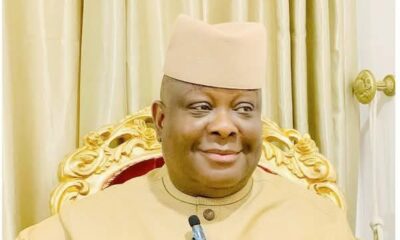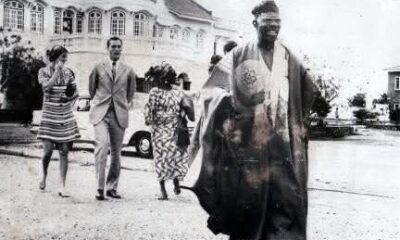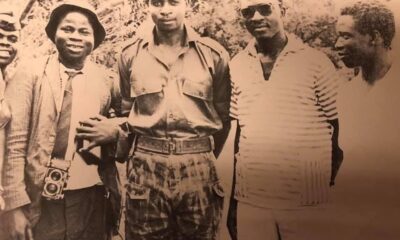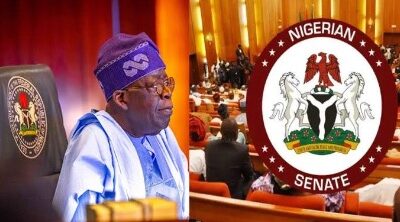Politics
Net closing in on South Korea’s president as MPs get death threats over impeachment vote
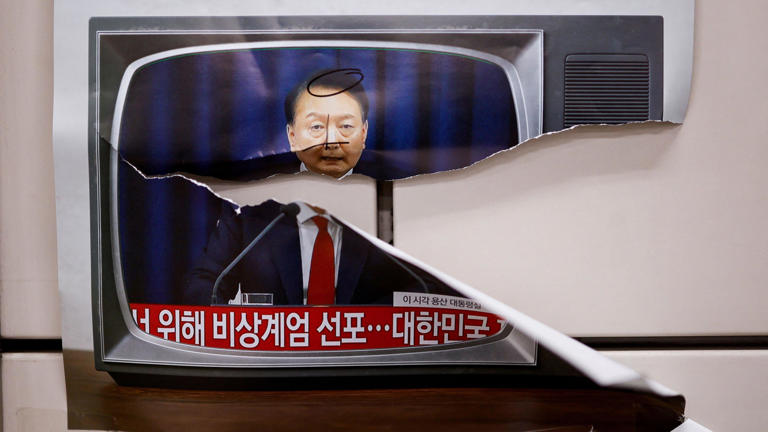
The news is moving so quickly in South Korea, the papers can no longer keep up. President Yoon Suk Yeol’s shock attempt to impose martial law last Tuesday night was so short-lived it failed to make the front page. By the time he despatched the troops, the press had already gone to print. By the following day’s editions, the failed power-grab had already been defeated.
Within the week, the president has morphed from being contrite and apologetic, hoping to avoid impeachment, to brazenly defiant, vowing to fight on as the net closed in on him.
Banned from leaving the country while he is investigated for treason – a crime punishable by death – he is facing a second impeachment vote this weekend, as support from his party trickles away. Meanwhile, the roars of anger from the thousands of people on the street every night are getting louder.
For a short while this week it looked as if he had struck a deal with his party to stand down early, in return for them not booting him out of office in last Saturday’s vote. But as the week sped by, there was no sign of the president nor the details of such plan, and it gradually became obvious Yoon had zero intention of resigning.
On Thursday, he emerged obstinate. “I will fight until the end,” he declared, as he defended his decision to seize control of the country.
His speech was rambling and filled with unsubstantiated conspiracy theories, including a vague suggestion that North Korea could have rigged the previous elections, in which he had failed to win control of parliament. The parliament was a “monster”, he said; the opposition party “dangerous”, and he, by declaring martial law, was trying to protect the people and save democracy.
Yoon spent much of this week in hiding, while police attempted to raid his offices to gather evidence. To try and temper public anger, his party announced that he would not be allowed to make decisions going forward – even though legal experts agreed there was nothing in the constitution that allowed for this.
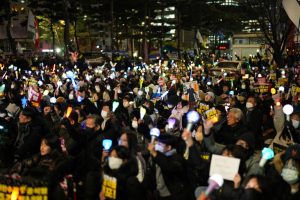
Protesters are angry with Yoon – and the MPs who are shielding him
© BBC
This has left everyone with the same, pressing question – who IS running the country? – especially as senior commanders of Yoon’s army have said they would defy his orders if he tried to impose martial law again.
There is now an unnerving power vacuum in a country that lives with the continuous threat of being attacked by North Korea. “There is no legal basis for this arrangement. We are in a dangerous and chaotic situation,” said Lim Ji-bong, a law professor at Sogang University.
It was evident to all those on the outside that this destabilising and bizarre situation could not be allowed to continue much longer. But it took the president’s party, the People Power Party (PPP), some time to realise Yoon’s impeachment was unavoidable.
Initially his party members protected him, eager to save their own political skins, and consumed by their hatred of South Korea’s opposition leader, Lee Jae-myung, who they fear will become president if Yoon is removed. But on Thursday, after stalling for days, the PPP leader, Han Dong-hoon, came out to urge all MPs to impeach him. “The president must be suspended from office immediately,” he said.
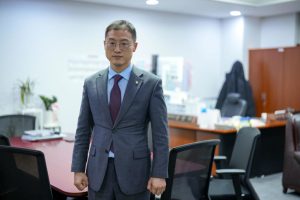
MP Kim Sang-wook plans to vote against the president
© BBC
For the impeachment to pass, two-thirds of parliament must vote in favour, meaning eight ruling party MPs must join the opposition. A handful have so far declared their intention to do so. One of the first to change his mind was Kim Sang-wook. “The president is no longer qualified to lead the country, he is totally unfit,” he told the BBC from his office at the National Assembly.
But Kim said not all MPs would follow his lead; there is a core that will stay loyal to Yoon. In his very conservative constituency, Lee said he had received death threats for switching sides. “My party and supporters have called me a traitor,” he said, labelling South Korean politics as “intensely tribal”.
The vast majority of anger, however, has been directed at the MPs who have shielded Yoon up to this point.
At a protest on Wednesday night the chants had changed from merely “impeach Yoon” to “impeach Yoon, dissolve the party”.
“I hate them both so much right now, but I think I hate the MPs even more than the president,” said a 31-year-old graduate student Chang Yo-hoon, who had joined tens of thousands of others, in freezing temperatures, to voice his disillusionment.
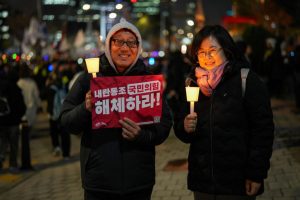
Chang Yo-hoon (left) was among those attending the street protests
© BBC
All week, lawmakers have been bombarded with thousands of abusive messages and phone calls from the public, in what one member described to me as “phone terrorism”, while some have been sent funeral flowers.
Even if enough MPs vote to impeach Yoon this weekend, his party, now divided and widely detested, faces political oblivion. “We don’t even know who we are or what we stand for anymore,” one exasperated party official told me.
The defecting lawmaker Kim Sang-wook thinks it will take time to regain voters’ trust. “We will not disappear, but we need to rebuild ourselves from scratch,” he said. “There is a saying that South Korea’s economy and culture are first class, but its politics are third class. Now is the chance to reflect on that.”
Yoon has dealt a severe blow to South Korea’s reputation as a well-established, albeit young, democracy. There was pride when MPs swiftly overturned the president’s martial law decision, that the country’s democratic institutions were functioning after all. But the fragility of the system was exposed again, as the party manoeuvred to keep him in office, with the opposition branding this a “second coup”.
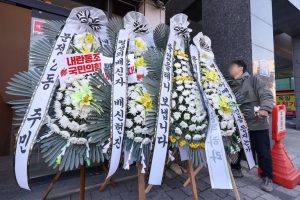
Traditional floral banners for a funeral have been sent to MPs as they consider how to vote
© News1
But Professor Yun Jeong-in, a research professor at Korea University’s Legal Research Institute, insisted the country was dealing with “an aberration, not a systemic failure of democracy”, pointing to the mass protests every night. “People are not panicking; they are fighting back. They see democracy as something that is rightfully theirs,” she said.
Damage has also been done to South Korea’s international relationships, and ironically to much of what Yoon wanted to achieve. He had a vison that South Korea would become a “global pivotal state”, playing a bigger role on the world stage. He even hoped to earn Seoul an invitation to join the elite group of G7 countries.
A Western diplomat told me they were hoping for a “swift resolution” to the crisis. “We need South Korea to be a stable partner. Impeachment would be a step in the right direction.”
If Yoon is suspended from office on Saturday, he will not leave without a fight. A prosecutor by trade, who knows the law inside out, he has decided he would rather be impeached, and challenge the decision when it goes to court, than go quietly. And the shockwaves he has set off are going to ripple through the country for years, perhaps decades, to follow.
Additional reporting by Jake Kwon and Hosu Lee.
Politics
IMO WEST SENATOR IZUNASO WARNS AGAINST RISING TREND OF ILL-PREPARED LEADERS IN NIGERIA.
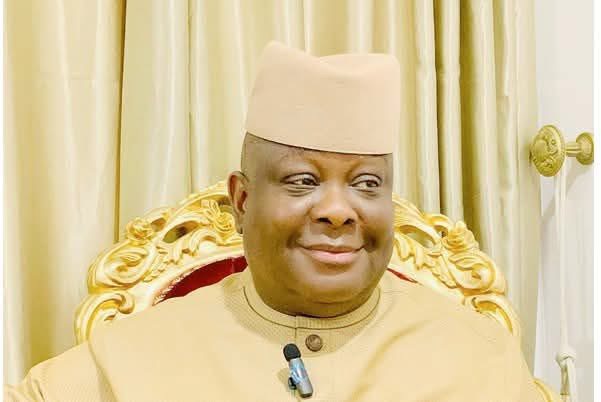
By Prince Uwalaka Chimaroke
17- DEC- 2025
The Senator representing Imo West Senatorial District and Chairman of the Senate Committee on Capital Markets, Senator Osita Izunaso, has expressed deep concern over what he described as the increasing occupation of political offices by individuals lacking the training, discipline, and values required for effective leadership.
Speaking in Abuja on Wednesday at the public presentation of Leadership 365: Daily Reflection for Effective Leadership, authored by Dr. Linus Okorie, President of the GOTNI Leadership Centre, the lawmaker noted that leadership in Nigeria is often misunderstood as merely holding public office rather than demonstrating character, competence, and vision.
Senator Izunaso stressed that authority does not automatically confer leadership, lamenting the absence of intentional leadership development structures in the country. According to him, many political actors assume leadership positions without adequate preparation, resulting in poor conduct, weak decision-making, and a disconnect from the people they serve.
He explained that true leadership reflects in attitude, speech, and behaviour, noting that leaders are constantly under public scrutiny and must therefore conduct themselves with responsibility and restraint. He added that leadership is not exclusive to political office holders, pointing out that leaders often emerge naturally in everyday settings based on influence and character rather than titles.
The lawmaker commended Dr. Okorie for contributing to leadership discourse through his book, describing it as a thoughtful work that highlights leadership as a daily responsibility applicable to all spheres of life. He emphasized that leadership is often revealed through action and integrity, not position, and can be identified even among children through observation of behaviour and influence.
Addressing young Nigerians, Senator Izunaso cautioned against the growing obsession with quick wealth, urging them instead to embrace mentorship and positive role models whose lives reflect sound values. He advised that money should not be the primary measure for choosing role models, stressing the importance of character and long-term impact.
The senator further observed that while technology and artificial intelligence are shaping the modern world, they can never replace the power of the human spirit. He noted that when properly guided, human capacity can drive meaningful change capable of transforming institutions, economies, and nations.
In his remarks, Dr. Okorie underscored the importance of deliberate leadership grooming, stating that nations that have achieved sustainable development did so by investing consciously in leadership capital. He explained that the book was written to encourage consistent self-reflection and inspire individuals committed to making a positive difference in society.
Observers note that concerns about leadership quality have remained a recurring issue in Nigeria’s governance discourse, with critics often pointing to weak institutions, policy inconsistency, and a political culture that prioritizes patronage over competence as major challenges to national development.
Politics
Engineers Farouk Ahmed, Gbenga Komolafe resign, President Tinubu nominates successors to the Senate for approval
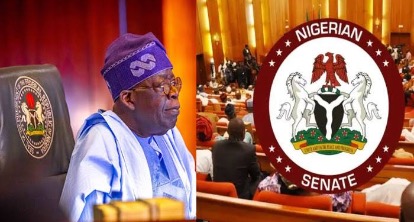
President Bola Ahmed Tinubu has asked the Senate to approve the nominations of two new chief executives for the Nigerian Midstream and Downstream Petroleum Regulatory Authority (NMDPRA) and the Nigerian Upstream Petroleum Regulatory Commission (NUPRC).
The requests followed the resignation of Engineer Farouk Ahmed of the NMDPRA and Gbenga Komolafe of the NUPRC. Both officials were appointed in 2021 by former President Buhari to lead the two regulatory agencies created by the Petroleum Industry Act (PIA).
To fill these positions, President Tinubu has written to the Senate, requesting expedited confirmation of Oritsemeyiwa Amanorisewo Eyesan as CEO of NUPRC and Engineer Saidu Aliyu Mohammed as CEO of NMDPRA.
The two nominees are seasoned professionals in the oil and gas industry.
Eyesan, a graduate of Economics from the University of Benin, spent nearly 33 years with the NNPC and its subsidiaries. She retired as Executive Vice President, Upstream (2023–2024), and previously served as Group General Manager, Corporate Planning and Strategy at NNPC from 2019 to 2023.
Engineer Saidu Aliyu Mohammed, born in 1957 in Gombe, graduated from Ahmadu Bello University in 1981 with a Bachelor’s in Chemical Engineering. He was announced today as an independent non-executive director at Seplat Energy.
His prior roles include Managing Director of Kaduna Refining and Petrochemical Company and Nigerian Gas Company, as well as Chair of the boards of West African Gas Pipeline Company, Nigeria LNG subsidiaries, and NNPC Retail.
He also served as Group Executive Director/Chief Operating Officer, Gas & Power Directorate, where he provided strategic leadership for major gas projects and policy frameworks, including the Gas Masterplan, Gas Network Code, and contributions to the Petroleum Industry Act (PIA).
Engineer Mohammed played a pivotal role in delivering key projects such as the Escravos–Lagos Pipeline Expansion, the Ajaokuta–Kaduna–Kano (AKK) Gas Pipeline, and Nigeria LNG Train.
EVENTS
PRESIDENT TINUBU CONGRATULATES SENATOR IFEANYI ARARUME ON HIS BIRTHDAY
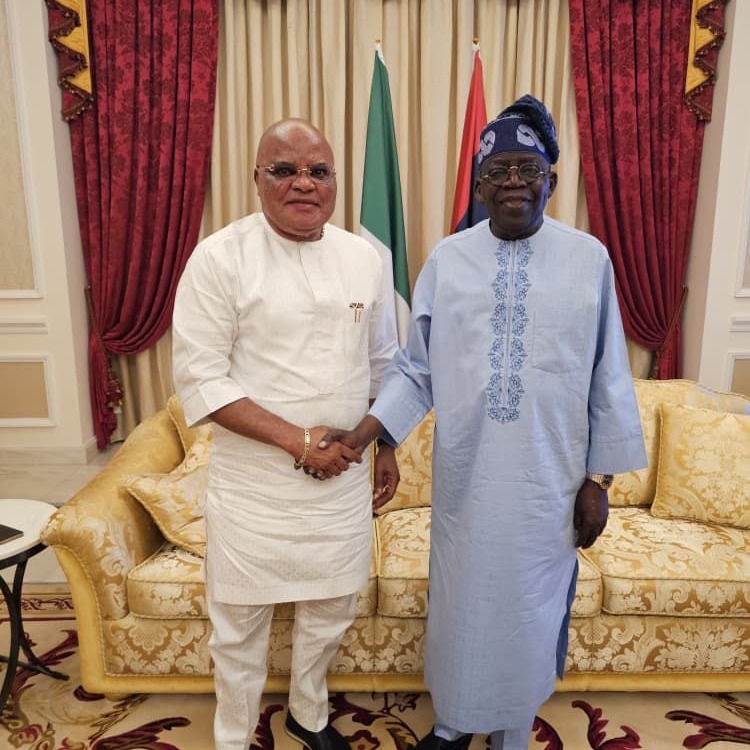
President Bola Tinubu felicitates Senator Ifeanyi Godwin Ararume, astute politician and accomplished businessman, on his birthday, December 16.
Senator Ararume’s odyssey in politics began in the late 1980s, when he served as the State Treasurer of the Liberal Convention in old Imo State. He later joined the National Finance Committee of the defunct National Republican Convention.
He represented Imo North in the 9th National Assembly. He was first elected in May 1999 and re-elected in April 2003. He also served on several committees and held other official roles.
President Tinubu commends the former senator for his years of service to the nation and contributions to its peace, unity, and progress.
The President describes Senator Ararume as a resolute and shrewd politician, highlighting his courageous and remarkable political journey through the years.
President Tinubu wishes Senator Ararume a happy 67th birthday and prays that God Almighty will grant him more years of good health and strength.
-
Business1 year ago
US court acquits Air Peace boss, slams Mayfield $4000 fine
-

 Trending1 year ago
Trending1 year agoNYA demands release of ‘abducted’ Imo chairman, preaches good governance
-

 Politics1 year ago
Politics1 year agoMexico’s new president causes concern just weeks before the US elections
-

 Politics1 year ago
Politics1 year agoPutin invites 20 world leaders
-

 Politics1 year ago
Politics1 year agoRussia bans imports of agro-products from Kazakhstan after refusal to join BRICS
-
Entertainment1 year ago
Bobrisky falls ill in police custody, rushed to hospital
-
Entertainment1 year ago
Bobrisky transferred from Immigration to FCID, spends night behind bars
-
Education1 year ago
GOVERNOR FUBARA APPOINTS COUNCIL MEMBERS FOR KEN SARO-WIWA POLYTECHNIC BORI

